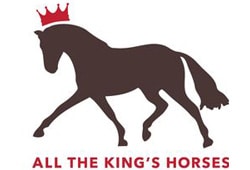
King’s Lessons from Horses


King’s Lessons from Horses

Shalom,
This Shabbat we will read from the Torah portion ‘Shoftim’.
In this Torah portion Moses instructs the people of Israel to appoint judges and law enforcement officers in every city.
It also includes the prohibitions against idolatry and sorcery and guidelines for the creation of “cities of refuge” for the inadvertent murderer.
Also set forth are many of the rules of war.
The exemption from battle for:
- one who has just built a home,
- one who planted a vineyard,
- one who got married,
- one who is “afraid and soft-hearted”.
It includes the requirement to offer terms of peace before attacking a city.
And there is the law that forbids to cut down a fruit tree when laying siege (in this context the Torah makes the famous statement, “For man is a tree of the field”).
There are also laws governing the appointment and behavior of a king and there is a verse cautioning the king:
רַק לֹא יַרְבֶּה לּוֹ סוּסִים וְלֹא יָשִׁיב אֶת הָעָם מִצְרַיְמָה לְמַעַן הַרְבּוֹת סוּס
“Only he shall not multiply for himself horses, and he shall not return the nation to Egypt in order to multiply horse(s).” (Deut. 17:16)
At the beginning of the verse the Hebrew word “horses” – סוסים appears in the plural form and at the end of the verse the Hebrew word appears in the singular form: “horse.” – סוס
What is the reason for this change?
The “Chafetz Chaim” – Rabbi Yisrael Meir of Radin explained:
The psychology of a human being is such that in the beginning he needs to be offered a very alluring proposition with a large payoff to transgress.
Only then in general will a person be enticed to commit something that in the beginning seemed to him to be immoral or forbidden.
But, after the person is enticed once or twice for what seems to him to be a great reward, he is ready after that to commit a sin for a reward that is much lower.
Our Sages taught us:
כֵּיוָן שֶׁעָבַר אָדָם עֲבֵרָה וְשָׁנָהבָּהּ, נַעֲשֵׂית לוֹ כְּהֶתֵּר
“Since a person has committed a sin and repeated it, it is made to him as permissible cunduct.“
Therefore, says the Chafetz Chaim, the Torah opens with a verse that cautions the king of Israel in the plural:
“He shall not multiply for himself horses” – that is to say, even if they offer him many horses at an inexpensive price, it is prohibited for him to be enticed to acquire them,
for if he will not pass this test and he will multiply for himself horses – he will then deteriorate furhter and further and in the end he will want to return to Egypt even for only one horse…
Shabbat Shalom
Yoel & Orly
Many people ask us for a permission to redistribute our newsletters – by all means, please do feel free to forward this newsletter to anyone you wish!
Our archive of posts and newsletters may be found at:
https://www.ulpanor.com/category/newletter/






